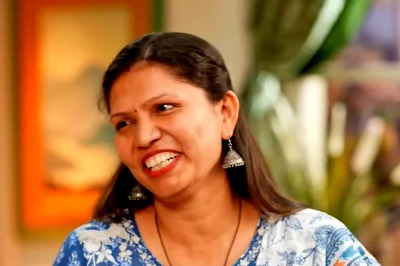
views
At a time when Instagram is doing its best to counter hate speech, bullying, spread of misinformation and the usual irritations that come with a social media network including influencers hawking products that you may not want to buy, this conversation between a father and daughter really tells us what social media networks should really be about. The father in this case being former India cricketer and current BCCI president Sourav Ganguly. A couple of days ago, Ganguly posted a photo of himself (not a selfie, but clicked by someone else) on Instagram, while looking at something with the sort of expression that suggests he is not best pleased about whatever it is that he is seeing. His daughter, Sana Ganguly replied asking what was it that he wasn’t liking. To this, the father came up with a witty reply, “…that ur becoming so disobedient.” But that wittiness wouldn’t stand a chance in the face of what came next. “@souravganguly learning from you,” replied Sana Ganguly, with a dancing and laughing emoji to go with the post.
Social networks in general have been struggling with a lot of negativity, be it for the posts that are shared by users or the very handling of what may or may not be categorized as bullying, hate speech, extremism, racism and online abuse. The problem became so bad that in July this year, the Facebook-owned social network announced that it was making its moderation policies more robust and will now warn users who have been regularly violating the content policies that their account is about to be deleted—before actually deleting it if the infringements continue. “If you post something that goes against our guidelines again, your account may be deleted,” reads the message on the notification page. This warning update will also show the user in question the list of posts, comments, and stories (whichever received a strike) that Instagram has had to moderate and remove from the platform along with the explanation as to why these posts were removed.
“Instagram is not a place to support or praise terrorism, organized crime, or hate groups. Offering sexual services, buying or selling firearms, alcohol, and tobacco products between private individuals, and buying or selling illegal or prescription drugs (even if legal in your region) are also not allowed. Instagram also prohibits the sale of live animals between private individuals, though brick-and-mortar,” says Instagram in the Community Guidelines which attempt to cover a wide range of issues that may cause problems on social media. “We want to foster a positive, diverse community. We remove content that contains credible threats or hate speech, content that targets private individuals to degrade or shame them, personal information meant to blackmail or harass someone, and repeated unwanted messages. We do generally allow stronger conversation around people who are featured in the news or have a large public audience due to their profession or chosen activities,” they go on to say.
In the quarterly Community Standards Enforcement Report released earlier this month, Facebook added Instagram data to the transparency report for the first time. “In this first report for Instagram, we are providing data on four policy areas: child nudity and child sexual exploitation; regulated goods — specifically, illicit firearm and drug sales; suicide and self-injury; and terrorist propaganda. The report does not include appeals and restores metrics for Instagram, as appeals on Instagram were only launched in Q2 of this year, but these will be included in future reports,” said Guy Rosen, VP Integrity, Facebook at the time.
Facebook says they removed about 1.5 million pieces of drug sale content, of which 95.3% we detected proactively, in Q3 2019 on Instagram. In the same period, they removed about 58,600 pieces of firearm sales content, of which 91.3% we detected proactively. The present edition of the report doesn’t talk about Instagram’s problem with fake accounts, hate speech, and violent content but we expect those to become a part of the data in the coming quarters.
Over time, Instagram as well as the likes of Facebook and Twitter became far too serious. Everyone wants to show they know more, everyone wants to assert their opinion (irrespective of how dubious it may be) and everyone just seems to be angry about something or the other. Along the way, bullies, those who spread fake news and even terrorist sympathisers found their place on these social networks. That was never how it was supposed to be. Maybe it is time to reclaim the social networks.

















Comments
0 comment